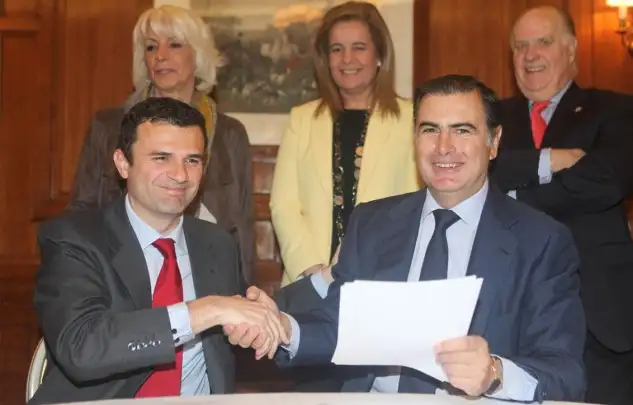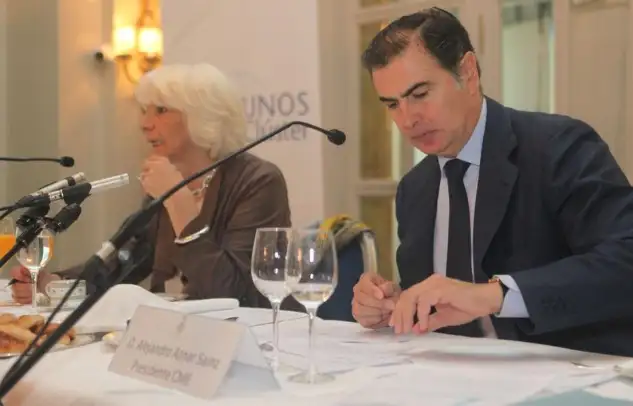
Alejandro Aznar: The Cluster is an excellent tool to defend and represent the Sector
Alejandro Aznar: The Cluster is an excellent tool to defend and represent the Sector
In November last year, the twenty-sixth Assembly of the Spanish Maritime Cluster unanimously elected Alejandro Aznar as president of the organization, who, in this interview, details the intentions and projects with which he faces his mandate and values the situation and prospects of the Spanish Maritime Sector.
What is the focus of action as President of the Spanish Maritime Cluster?
I must first say that, as far as I have been able to check since I arrived, the Cluster is working very well and I therefore believe that the same lines of action and the provision of current services must be followed. But one of the objectives I have set for myself from the beginning is to expand the base of partners, and also of partners that are not necessarily business associations that represent sectors, but can be individual companies.
Within that objective, we can say that we are "on the campaign," and we already have twenty new additions, most of them companies, of which we reported in the Assembly last April. Many others are in the process of being incorporated and the aim is to reach a hundred partners shortly. The cluster already had a healthy economy, but this increase in the social mass will increase its budget, which will benefit the partners. More projects can be done, more working groups, more staff... It's about having that healthy economy I mentioned, but not for money to be in the box, if not for more movement, more activities that interest partners. In that regard, the Assembly had already been informed of the recruitment of a person to focus on the partner and in future the projects would be able to have fellows. In short, we can provide more and better services to partners.
Is there any segment of activity that is not sufficiently represented in the Cluster?
We are now in the process of electing representatives of the subsectors to the Executive Commission. We presented to the Assembly how the companies had been covered within the twelve subsectors that we now have, and I think I am quite well attached. Companies now have to work with the secretariat and assess whether they are comfortable in the subsector that a priori has been assigned to them or want to make some change, and from there the representatives will be elected. But if companies continue to enter, it is important that they have that comfort and that the subsectors have an operational size and work well. This could result in the creation of some more but I believe that in principle all activities are covered well.
What will be the most important lines of work and what can be opened?
The Cluster is not a business association for use, it is a cross-cutting association that must respond to the interests of the partners and, therefore, live and open to everything that interests the partners. Right now the working groups that have opened are those that the partners have considered appropriate and in that line we want to follow, listen to proposals and create new groups and activities if deemed necessary.
That ability to serve partners and meet their needs would be one of the great strengths of the Cluster, but where are their weaknesses, if any?
So far, I've only seen strengths. From the outside - we have been partners for a year as the Ibaizábala Tailor Company - it had advantages. But I have had only positive surprises inside, because I see that this tool, well managed, gives and can give in the future a lot of game to the partners. The Cluster is a magnificent meeting point for the entire Maritime Sector.
It's also a good time for the sector, with a recovery taking on...
First we have to try to make the sector no longer fall, because Spain has quite fallen in the Maritime Sector in recent years... and yet we remain a first-class maritime power and the Sea represents 2, 8 percent of our Gross Domestic Product. It should be noted that Spain has almost 8,000 kilometres of coast, that the ocean is the main creator of employment and economic wealth and that the maritime sector represents a substantial part of the Spanish economy.
Although the deterioration of the sector has been significant in recent years...
Maritime policy was very important to the extent that it favoured industrial policy, especially the activity of shipyards. That is a constant in the last century that involved the support of the shipowners to build ships. The reduction in the activity of the shipyards which were decisive, as I say, to support the shipowner, led, together with the incorporation into the European Economic Community, to a change in many regulatory and aid schemes, to a conversion of the whole sector which has caused a strong decline over the last 30 years. Despite that, the Sea remains economically important and the effort being made not to lose what is there and, in some way, to revitalize the Sector is important. Also there, the Cluster has its role in promoting the sector that interests all of us in it.
However, Spain is not a country very concerned about the Sea...
Spain, as has always been said, lives on its back to the Sea and we have to try to awaken that maritime consciousness which is one of the subjects that we have pending all of us around the Sea. The cluster can greatly facilitate this work. Because it has a cross-cutting, non-sectoral character, it can go beyond very specific interests to defend the general interests of the Sea vis-à-vis Spanish society. We must reverse a situation where much of the information that comes to society about the Sea is negative. We've recently suffered a fuel spill, the fire on a ship... negative news...
But it must be said that the Spanish Maritime Sector generates about EUR 27 billion in production and 7.39% of the gross added value of the Spanish economy. That the Sea gives direct employment to 467,517 people, 2.3% of the total in Spain, and including indirect and induced effects, generates 1,260,928 jobs, 6.28% of total employment. In addition, industry supports and collaborates with the activities of many other sectors. I think the cluster that includes everyone is the one who can best convey that positive image.
The Cluster covers much of the sector but in front of it, especially the administrations, there is no single partner for the maritime sector...
There is a certain dispersion and there are people who claim less interlocutors. There are many ministries, powers related to the Sea transferred to the Autonomous Communities, very different bodies... The skills are distributed in very diverse and very dispersed areas, and the Cluster also has the challenge of transmitting that the Sea needs a more unified and clear interaction.
At the international level, how do you see the activity of the Cluster?
The cluster is a European Union-led instrument in the Blue Paper and there are already 18 clusters at European level. Now, even, there is talk of creating a cluster at European level, so its international dimension is relevant. In September, the Spanish Maritime Cluster will host the European meeting of European clusters to be held in Madrid, which is an important occasion for us.
A European cluster, would it not cause tensions for competition between countries?
I don't think there are regional and local clusters in Spain too... A cluster is an association of companies that group together to seek and pursue common interests and purposes because they think together they are better than separated. This idea can work at both local and regional and national levels, and we will see what the new European cluster project is and which it proposes, and depending on it, the national clusters will support it to a greater or lesser extent. I do not believe, in short, that the European cluster is of no importance to nationals.

Alejandro Aznar in the signing of the Convention "Province of Cadiz. South European Logistics Platform"
Spain has a very important cultural heritage related to the Sea, which is perhaps little known, and is underutilized. Also in that field there is work to be done...
If it's true. This is specifically the responsibility of the Royal Academy of the Sea and the Naval League, and during my stay in the presidency of the cluster I want to encourage a rapprochement between all the actors in the sector, also in this field. We are few and we cannot allow each one to make war on their own. I believe that the Academy and the League have to work more together to defend this immense historical-cultural heritage, and my idea is that it is necessary to group efforts in this field, and also to generate an intense relationship and active coordination with the Cluster that I want it to be already in place in June.
That joint work could help to create that maritime awareness I mentioned earlier...
Of course, but it is important to make use of the resources we have, and that no one act on their own, so that the efforts we all make will be more visible. It makes no sense for anyone to get in the field of another, but support and collaboration among all.
Finally, how would you like to leave the cluster at the end of your presidency?
I would like to see that in that period, which I think should be short for it to be effective, the fundamental axis is that which I mentioned: To unite the efforts of the different actors in this maritime world, because it is the only way to bring to society the great importance of the sector.
Source: Spanish Maritime Cluster
© 2024 Nautica Digital Europe - www.nauticadigital.eu













